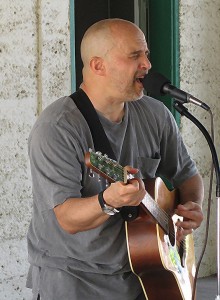Yesterday I was riding in a cab driving by Hakim, a young man who came to the U.S. eleven years ago from Kenya. During the cab ride to downtown KC, we discussed the many businessmen who treat professional sports like a religion. Many of them spend several thousands of dollars per year for the privilege of showing up several times per week to watch millionaire-athletes play games while eating $6 hotdogs and drinking $8 cups of beer.
The conversation then turned to some of the many things one can do without spending much money, as well as many alternative ways to spend the $4,000 you might spend to watch a package of baseball games over the course of a season. Hakim works to support his family here in the United States, but he sends an extra $200 per month to Kenya each month, which fully supports his widowed sister and her three children. Hakim is also going to school to learn computer programming. He was a thoughtful and enterprising fellow and I really enjoyed our conversation.
I continued thinking about money and healthy ways of spending discretionary time this morning at the Tower Grove Farmer's Market, in Tower Grove Park, near my home in St. Louis, Missouri. But then it struck me that there was a lot of ugly low-priced socialism going on all around me. You see, the government runs the park, inviting families to come swim in a big fountain and shop for food directly from farmer-vendors, no corporate middle-men and no heavy-handed corporate sponsors taking control of the natural ebbs and flows of those who attend (though a few good-hearted local businesses pitch in to make the event possible). I took the following photo of the many socialists splashing in the fountain (I tweaked it with Photoshop, trying to make it artsy and also because I wanted to obscure the identities of the folks in the photo. BTW, feel free to click to enlarge the image).
 As I drove to the park on a government-paid road, I had passed a government-paid (socialist) police officer. It occurred to me that this sort of socialism is not unusual. There is both a socialized fire department and a a socialized library near the park, as well as many socialized (public) schools.
Then, to exacerbate the situation, Steve Albers showed up, unpaid, to provide live music (disclosure: Steve is my brother-in-law). Steve, who is an excellent blues musician but a confused capitalist, decided to put out a bucket for cash donations--all of it to go to the organizer of the market so that it could hire out other local professional music acts on future weekends.
As I drove to the park on a government-paid road, I had passed a government-paid (socialist) police officer. It occurred to me that this sort of socialism is not unusual. There is both a socialized fire department and a a socialized library near the park, as well as many socialized (public) schools.
Then, to exacerbate the situation, Steve Albers showed up, unpaid, to provide live music (disclosure: Steve is my brother-in-law). Steve, who is an excellent blues musician but a confused capitalist, decided to put out a bucket for cash donations--all of it to go to the organizer of the market so that it could hire out other local professional music acts on future weekends.
 Bottom line: a government operated park, no heavy-handed corporate sponsors, free music, free fountain, donations for future non-profit endeavors. People self-organizing without the assistance of any corporate mascot, without anyone telling them how to have fun. Lively and thoughtful conversation everywhere. Children spontaneously dancing, with dedicated parents nearby. Tall trees, fresh air and the recurring thought that this is what life is really about. Ubiquitous healthy food. The honest and spontaneous power of the grass roots--people choosing to be the people they are. I'm hearing Chicago's "Saturday in the Park" as I write this.
I've seen the dour faces of the people who attend high-priced "fun" at corporate entertainment, while slurping their $8 beer. They are people who are barraged with advertisements all over the stadium, and they are constantly being told when to applaud by a corporate-sponsored scoreboard and PA.
Bottom line: a government operated park, no heavy-handed corporate sponsors, free music, free fountain, donations for future non-profit endeavors. People self-organizing without the assistance of any corporate mascot, without anyone telling them how to have fun. Lively and thoughtful conversation everywhere. Children spontaneously dancing, with dedicated parents nearby. Tall trees, fresh air and the recurring thought that this is what life is really about. Ubiquitous healthy food. The honest and spontaneous power of the grass roots--people choosing to be the people they are. I'm hearing Chicago's "Saturday in the Park" as I write this.
I've seen the dour faces of the people who attend high-priced "fun" at corporate entertainment, while slurping their $8 beer. They are people who are barraged with advertisements all over the stadium, and they are constantly being told when to applaud by a corporate-sponsored scoreboard and PA.
 They are carefully searched on the way into the stadium to make damned sure that they don't bring in their own alcoholic drinks (oh, year, 12% of this expensive and unnecessary new stadium was constructed using taxpayer money).
I can guarantee that the fun per dollar spent was much higher today. That's my thought for this morning: that we don't need to be told how to have fun by big corporations. We are better off spending next to nothing creating our own low-priced entertainment.
They are carefully searched on the way into the stadium to make damned sure that they don't bring in their own alcoholic drinks (oh, year, 12% of this expensive and unnecessary new stadium was constructed using taxpayer money).
I can guarantee that the fun per dollar spent was much higher today. That's my thought for this morning: that we don't need to be told how to have fun by big corporations. We are better off spending next to nothing creating our own low-priced entertainment.



